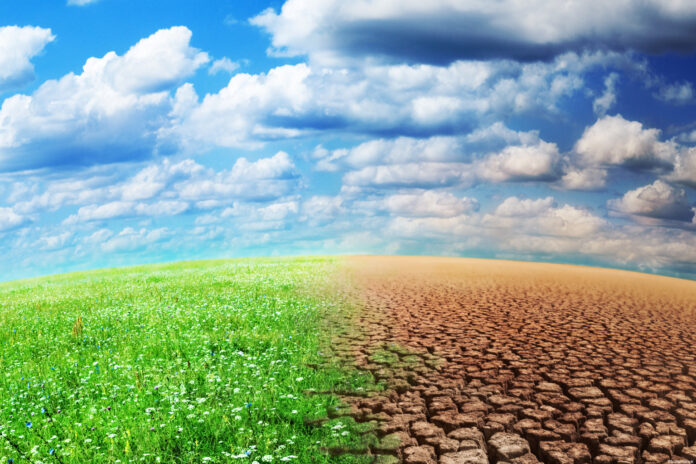The consequences of global warming affect all regions of the world, but one continent seems to be much more affected by the disruption of the natural phenomena of the greenhouse effect more than the others: Africa.
In 2020, 32 billion tonnes of CO2 were emitted into the atmosphere, a record.
According to BP Statistical Review Of World Energy, China produced 9.9 billion tons of CO2 in 2021 due to the export of consumer goods and its heavy dependence on coal. The United States produced 4.5 billion and India 2.3 billion. In Europe, ¼ of the European Union’s CO2 emissions come from Germany.
Africa is the continent that pollutes the environment the least while it is also the one that is most vulnerable to the effects of global warming. Over the past 50 years, it has warmed by 0.5 degrees compared to the pre-industrial period.
The impact on the continent’s climate varies by region. In warmer regions, drought episodes are getting longer and longer (example of the Sahel).
In the northern region of Africa, global warming will cause a decrease in rainfall and for southern Africa, an increase in heat waves and droughts.
Regarding agriculture, it will lead to a decrease in agricultural production, in particular the reduction of harvests of the main cereals throughout Africa. In Namibia, for example, the effects of global warming on agriculture are likely to reduce annual GDP by 1 to 6%.
In addition, sea level rise will threaten some major cities located on the coast such as Accra, Dar Es Salam, Lagos, Maputo. In countries like Mozambique, Cameroon, Tanzania and Senegal, up to 10 million people could be at risk from flooding.
Water resources could also decline, due to changes in rainfall patterns that could reduce water availability in some areas. Millions of people will be at risk if rainfall decreases to the point that underground resources can no longer be replenished.
On fishing, rising ocean temperatures and ocean acidification are drastically altering aquatic ecosystems. This puts the sustainability of fisheries and aquaculture at risk, as well as the livelihoods of communities that depend on fisheries.
Global warming can also promote disease and malnutrition. Extreme events such as floods can combine with longer-term changes such as rising temperatures to promote the spread of infectious diseases, displace malarious areas and exacerbate malnutrition.
As for the effects on the production of energy, that which depends on the hydraulic force will be the most affected. Changes in rainfall may increase generation capacity in East Africa, but decrease it in West and Southern Africa.
The resulting damage to the development of communities, countries and the region as a whole could undo Africa’s hard-won progress.
Uncertainty is a basic criterion in climate change, especially in Africa where there are large gaps in observed climate data.
UNEP (United Nations Environment Programme) officials Richard Munang and Jesica Andrews are not optimistic: “Climate change will bring unprecedented effects. For example, there will be a decline in agricultural yields, short growing seasons and changes in rainfall patterns will make access to water difficult. (…) Falling agricultural yields and population growth will put additional pressure on an already fragile food production system. »
In the same context, Arona Diedhiou, researcher from the IPCC (Intergovernmental Scientific Group on Climate Change) declared in Le Monde “the sea nibbles the coasts at the rate of 1 meter to 5 meters per year and weakens cities which represent 42% of West Africa’s economy and where a third of its population lives”. Djibouti, recalled its president Ismaël Omar Guelleh on September 23 at the United Nations platform, risks seeing a large part of its territory submerged by the end of the century.
The fragility of the political environment in certain regions of the continent exposed to the effects of global warming could also represent a factor that multiplies the threat, particularly conflicts. Clearly, a factor of wars. Expert in the matter, the President of Chad Idriss Deby summed up at the United Nations: “The main consequences of climate change in my country are, among other things, the decrease and variability in rainfall, droughts, the drop in agricultural production, the drying up and the shrinking of rivers such as Lake Chad, floods, heat waves, violent winds, the worrying advance of the desert, famine and the rural exodus making the bed of the terrorist threat. »
The countries of the world in general and Africa in particular, aware of the risk posed by the effects of global warming, came together in 2015 to adopt the historic Paris Agreement, committing to limit the rise in temperature to less than 2°C. 184 countries have joined, including almost all African countries. The agreement entered into force in November 2016. Under the Paris Agreement (COP21), countries have committed to take action to reduce emissions and build resilience. The treaty also provides for increased financial support from developed countries to support the efforts of developing countries.
On the scale of the African continent, the challenge is to strengthen access to energy while limiting the use of fossil fuels and to increase agricultural yields to ensure food security for a growing population without negatively impacting the soil. and biodiversity.
In 2007, a project called the green wall was born through the initiative of the African Union and about twenty countries, to fight against the advance of the Saharan desert. But interrupted by the political instability of some states concerned, the project could not be carried out properly.
The largest solar farm on the continent was inaugurated in 2017 in the Ouagadougou region. Giving fairly good results, it could eventually cover 5% of Burkina Faso’s needs. Nigeria, the most populous country on the continent, has committed to achieving 30% clean or renewable energy by 2030.
The African Union has created a project called the African Renewable Energy Initiative (AREI) supported by many African states and the European Union. It aims to strengthen the large-scale exploitation of the enormous potential of renewable energies on the African continent.
Throughout the African continent, the danger posed by climate change and therefore its effects on the lives of all Africans are no longer neglected. It is a real massive awareness that has taken place within almost all States, and initiatives, whether rural, national or community, are becoming more and more numerous.





